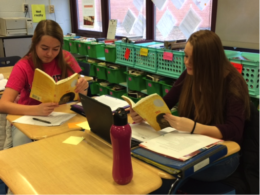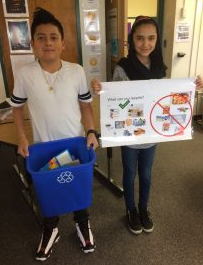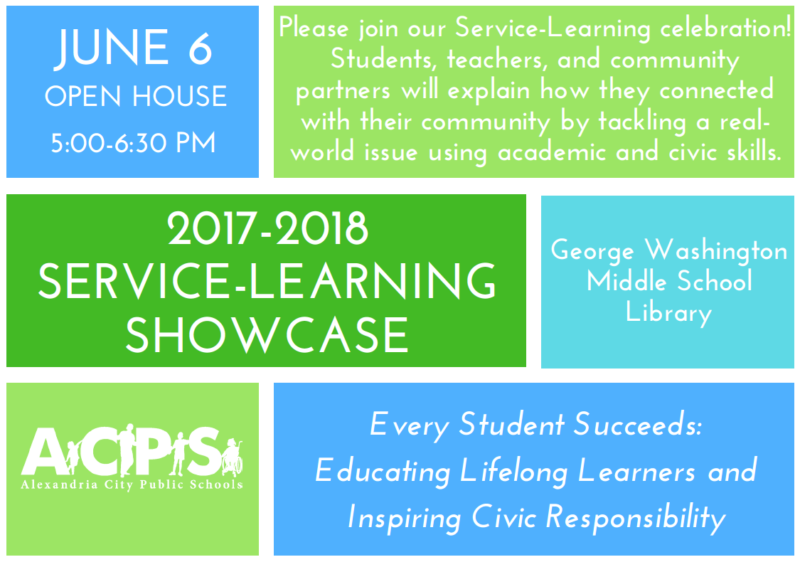When seventh-grade students in Ms. Feiler’s United States History 1865-Present class at George Washington Middle School started the school year, they knew they’d be learning a lot about the past. What they didn’t know is that they would be learning about civil rights from a long-time city resident who attended the segregated Parker-Gray School in Alexandria as a child; about the Berlin Wall from a veteran who served during the Cold War; about the Vietnam War from a former GW teacher; or about racism and discrimination in the south during the late 1900s from someone who lived through it.
These stories were captured as part of a student-driven service learning project where the class collected oral histories from individuals who experienced first-hand some of our country’s most historic periods and events based on units they were studying as part of the curriculum.
We did this project to learn about what happened in the past before we were born. We learned that a lot of people were not treated right. A lot of the interviews left me shocked because I didn’t know about all these things. I also learned how to use advanced technology, like Weebly, to create a website,” said Lilian Aguilar Castro.
Their oral histories are just one of the 16 projects being features at the ACPS Service Learning Showcase on Wednesday, June 6, from 5 to 6:30 p.m. in the George Washington Middle School Library.
Throughout the school year, students at Francis C. Hammond and George Washington middle schools, along with students from both T.C. Williams High School campuses have engaged in service-learning projects as an integral part of their studies. Students used their academic skills to identify and address problems in their schools, their communities and the world.
 Students in April Riser’s World Literature class at the Minnie Howard campus of T.C. Williams, inspired after reading, “Long Walk to Water,” wanted to raise awareness and money to help some of the more than 63 million people around the world who do not have access to clean water. Through their research, the students learned about human rights and the Universal Declaration of Human Rights. They committed to each walking 10 miles over two weeks to symbolize what children in Africa may walk every single day. They also created brochures and set up an online donation portal through a program that provides water to families. Through their efforts, the students raised enough money to provide water for seven people and they are continuing to raise funds. They are excited to have used research, writing, organizational, reading, communication and technology skills to help people on the other side of the world.
Students in April Riser’s World Literature class at the Minnie Howard campus of T.C. Williams, inspired after reading, “Long Walk to Water,” wanted to raise awareness and money to help some of the more than 63 million people around the world who do not have access to clean water. Through their research, the students learned about human rights and the Universal Declaration of Human Rights. They committed to each walking 10 miles over two weeks to symbolize what children in Africa may walk every single day. They also created brochures and set up an online donation portal through a program that provides water to families. Through their efforts, the students raised enough money to provide water for seven people and they are continuing to raise funds. They are excited to have used research, writing, organizational, reading, communication and technology skills to help people on the other side of the world.

Katrina Ford’s seventh-grade math students in Francis C. Hammond Middle School’s International Academy used their skills to estimate how much waste they generated and how much their school might be generating as a whole. They researched the impact of waste on the environment and came up with ways that more waste could be recycled in their school. They identified leaders in their community who could help, created an education campaign to get their peers on board, developed marketing materials and created a recycling program within their school.
[Our project] will change the world because from recycling we can make more things. If we start at the school, we are sharing our ideas to other school or our ideas will spread to the world, everywhere,” said Sumaira Hanifi.
Please join us at the Service Learning Showcase to learn more about the many impactful ways that our students collaborated over the past year to use their academic skills to learn about and address real-life issues in our community and in our world.

Learn more about the projects that will be featured and the essential questions they addressed:
- Building a Bilingual Community
How can I use the skills I already have to build relationships and literacy in the community? - Changing the World through Your Community
How are we connected to others? To what extent can reading great literature give us insight into ourselves and the world? How can great literature give us insight into the civilization that gave birth to it? To what extent can literature be considered morally constructive? - Greek Myths and their Meaning for Today
What can Greek Myths tell us about the Greeks? What can Greek Myths tell us about our lives today? - Hammond Beautification Project
How does where we learn impact how we learn? - Healthy Water Choices for Students
How does our school support water consumption? How do students and staff become responsible consumers of water in a school environment? - Language Learning Through Service Learning
How can I use my English language skills to create and implement a solution to a real world problem in my community? - Little Free Library for the Chirilagua Community
What is the importance of reading and literacy? In what ways do data and statistics help inform decisions for projects within my community? How can I help improve and be helpful to my community? In what ways does understanding geometry help create structures useful to my community? - Making Change for Our Watersheds
How can watershed health be used to determine ecological imbalances? How can scientific principles be applied to improve watershed health? - Minnie Howard Outdoor Classroom
How can we use our skills to work together and contribute to our school? - Proportions and Recycling
How much waste does the world create and what can we do about it? - Recorders of History
How can individual stories shape our understanding of history? How can we share people’s stories with others? - Special Education Resources for Families
How do communities process the strengths and needs of individuals with disabilities? How do communities include students with disabilities as lifelong residents and participants? How do communities make connections between students with disabilities and other community groups? - Student Leaders Making Change
What are the characteristics, roles and responsibilities of a leader? How can students develop their leadership skills? Why are the skills of managing meetings, time and resources important to effective leaders? How is communicating in the workplace essential to strong leadership? How do we effectively transfer these skills to enhance the Alexandria community, not just the school community? - Students Use Their Voice for Change
How can we use our voices to make change? How has our immigrant experience changed us? - The Solar System Speaks
How can we describe the relative movement of the planets? What happens when art and science collide? - Titans United
What are effective citizens? What citizen actions are most effective?
